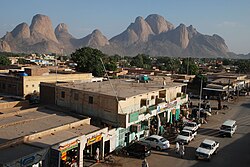
This is a list of cities and towns in Sudan . The population estimates are for 2006, [1] last national census was of 1993.

This is a list of cities and towns in Sudan . The population estimates are for 2006, [1] last national census was of 1993.
| Rank | Name | State | Pop. | ||||||
|---|---|---|---|---|---|---|---|---|---|
| 1 | Omdurman | Khartoum | 1,849,659 | ||||||
| 2 | Khartoum | Khartoum | 1,410,858 | ||||||
| 3 | Khartoum North | Khartoum | 1,012,211 | ||||||
| 4 | Nyala | South Darfur | 492,984 | ||||||
| 5 | Port Sudan | Red Sea | 394,561 | ||||||
| 6 | El-Obeid | North Kordofan | 345,126 | ||||||
| 7 | Kassala | Kassala | 298,529 | ||||||
| 8 | Wad Madani | Gezira | 289,482 | ||||||
| 9 | El-Gadarif | Al Qadarif | 269,395 | ||||||
| 10 | Al-Fashir | North Darfur | 217,827 | ||||||





